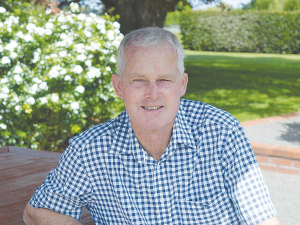State of the Dairy Nation 2024/25: DairyNZ Highlights Record Milk Production and Export Growth
DairyNZ's chief executive Campbell Parker says the 2024/25 dairy season reinforces the importance of the dairy sector to New Zealand.
 DairyNZ chair Jim van der Poel says teams will start going to farms from September to talk about how farmers need to report their emissions.
DairyNZ chair Jim van der Poel says teams will start going to farms from September to talk about how farmers need to report their emissions.
A joint initiative where farmers measure, reduce and pay for greenhouse gas emissions rather than being included in an emissions trading scheme swings into action later this year.
Teams from He Waka Eke Noa will start farm visits in September, DairyNZ chairman Jim van der Poel told the South Island Dairy Event (SIDE) in Ashburton last week.
He says over the coming months, DairyNZ and other farmer organisations will be talking a lot about He Waka Eke Noa.
"Teams will start going to farms from Septembe to talk to you in advance about how you need to request your emissions, what farm sequestration you will be able to claim and what pricing mechanisms will be looked at," he says.
Van der Poel later told Rural News that 2017 is the base year and we will all know New Zealand's total emissions from that point in time.
He says from September, He Waka Eke Noa teams will gather exactly what each farmer's emissions are.
"Then there will be incentives put in place because we have got a commitment to get it down by 10% by 2030," he says.
Van der Poel believes some of this will come from productivity and offsetting, but this won't be enough to hit the 10% target.
"So, we will have to come up with a formula," he says.
Those making the most gains will be financially incentivised and those with lesser gains will face a financial cost.
He says it's a work in progress: working out the formula and discussions with Government on sequestration.
Made up of 13 partners - dairy, red meat, horticulture and deer farmers, milk processors and meat companies, Māori and the Ministry for Primary Industries - He Waka Eke Noa is an alternative to farmers being included in an emissions trading scheme (ETS).
Van der Poel says it's an alternative arrangement the sector came to in partnership with the Government and Māori. "The Government's initial view was that farmers producing methane will enter ETS," he says.
The plan was to create a $50m processor tax, which would fund ways to mitigating farm emissions.
"A deal was made that agricultural emissions will not enter ETS," he added. "And we were given five years for all farmers to have a Farm Environment Plan, so they can measure and manage their emissions and we put in place an alternative mechnanism to incentivise best practise."
Van der Poel says, in reality, farmers will pay a price on their methane emissions from 1 January 2025.
"There's no way around that."
However, this will be separate from the ETS and be co-designed by the sector, government and Māori.
He Waka Eke Noa steering group is chaired by Massey University chancellor Michael Ahie and made up of stakeholder representatives.
The Meat Industry Association of New Zealand (MIA) today announced that Chief Executive Officer Sirma Karapeeva has resigned from the role.
The winners of the 2026 Hawke’s Bay/Wairarapa Dairy Industry Awards were announced at the annual awards dinner held at Copthorne Solway Park in Masterton on Thursday evening.
Environment Southland is welcoming this week’s decision by the Environmental Protection Authority (EPA) to approve the release of Blaptea elguetai, a leaf‑feeding beetle that will help control the highly invasive Chilean flame creeper.
This March, the potato industry is proudly celebrating International Women’s Day on 8 March alongside the International Year of the Woman Farmer, recognising the vital role women play across every part of the sector — from paddocks and packhouses to research, leadership, and innovation.
Fruit trader Seeka posted a record profit and returns to shareholders in 2025.
Recent weather events in the Bay of Plenty, Gisborne/Tairawhiti, and Canterbury have been declared a medium-scale adverse event.

OPINION: A mate of yours truly reckons rural Manawatu families are the latest to suffer under what he calls the…
OPINION: If old Winston Peters thinks building trade relations with new nations, such as India, isn't a necessary investment in…